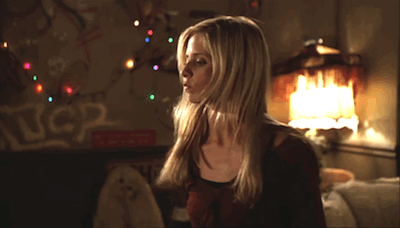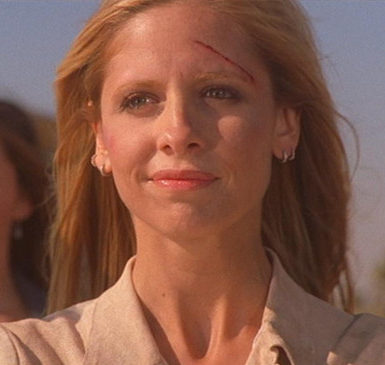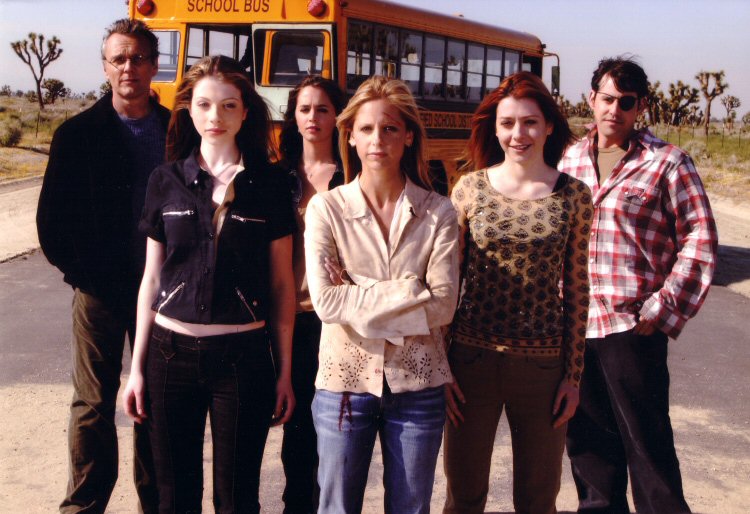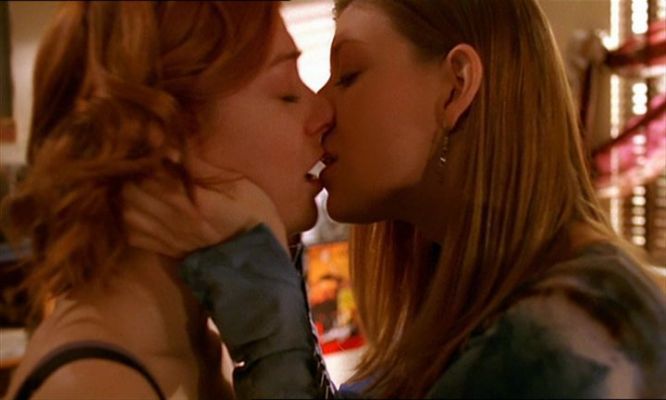Buffy the Vampire Slayer turns 20 today, and it still remains one of the most important and influential shows ever created. When Buffy debuted March 10, 1997 on The WB, it helped the merely two-year old network solidify its audience. While, yes, The WB used Buffy to primarily target teens—along with other mainstays like Dawson’s Creek and Felicity—the show quickly showed what it was capable of, killing main characters, turning lovers into nemeses, and strutting its acerbic, witty dialogue. Not only was Buffy smarter than its counterparts, it wasn’t afraid to turn high school show tropes completely inside out. Below the surface, it doesn’t take long to see the show for what it truly is: an allegory for life that uses literal demons as placeholders for real-life ones.
Over the course of its seven seasons, Buffy tackled heartbreak, death, addiction, social responsibility, depression, hope, and redemption, to name a few, all told through the feminist lens of a teenage vampire slayer, and later, a woman trying to find her place in the world while consistently shouldering the weight of it. While the show’s mythical elements stand for issues that face us in our every day lives, Buffy’s life also faced a never-ending share of tumult—her soulmate turned evil (literally), her friends’ lives were constantly in danger, her mom’s (naturally caused) death, a couple apocalypses, and her own death…both of them—but Buffy always found a way through. Whether through her friends or her own strength, Buffy showed us that no matter who you are or how strong you perceive yourself to be, it’s OK to falter and it’s OK to struggle.
Everything that made the show special, including everything that it stood for, still rings true today, crystallizing its place in television history. Subverting tropes was always one of Buffy‘s greatest accomplishments. While it constantly juggled comedy, horror and drama, expertly blending genres in every episode, it also knew how to go for the jugular, focusing in periodically to catch us off-guard. Cases in point, the absolute horrorfests like “Hush” and “Nightmares,” or the trippy, unsettling dreamscape of “Restless.” But its actors, led by the insanely versatile Sarah Michelle Gellar and supported by Alyson Hannigan, Nicholas Brenden and Anthony Stewart Head, also had tremendous comedic chops and musical abilities, allowing the show to reign free and flex various muscles, while never feeling tied down or pigeonholed.
While Buffy quickly became well known for its resourcefulness in tragedy and comedy—you always expected the unexpected in Sunnydale—genre tropes weren’t the only ceilings it shattered. Like the films of Quentin Tarantino or Ripley in the Alien series, Buffy held women with an extremely high regard. Female characters (and not just Buffy herself) were showed as strong, independent, loyal and worthy thanks to the show’s feminist creator, Joss Whedon. While our hero, the Slayer, was never shown to be perfect (just look at the darkness of Season 6, for a few examples), the show never treated women unfairly, despite each character’s flaws. As a result of Buffy’s dexterity and courage, every character, male and female, was allowed to develop, adapt, be brave, change, fuck up and be redeemed. Though they were surrounded by demons and other objects of fantasy, these characters were allowed to be human, bathed in gender equality from series start to series end.
Buffy also took on human sexuality head on in its fourth season, when Willow Rosenberg met a new friend, Tara Maclay, at Sunnydale University. Buffy paved new ground on television by becoming the first show to develop an accurately portrayed lesbian relationship between the two characters. The year was 1999. This is just one of the ways the show proved how ahead of its time it was. It was constantly pushing boundaries and forging ahead, creating storylines that either hadn’t been on TV before or ones that were eons away from TV norms.
Like its heroine, Buffy was forever fearless, changing the dynamics of TV going forward. While critics were in on the secret, Buffy never got the respect it quite deserved during its prime. But let’s make this crystal clear: Almost every show you watch—genre TV, horror, sci-fi, fantasy, etc.—owes a huge debt to Buffy the Vampire Slayer.
Buffy changed the rules. Buffy celebrated geek culture. Buffy showed that fantasy television was important…that people would watch it, that it was marketable, that it could garner a die-hard, never-miss-an-episode kind of audience that would be a network’s wet dream. And sure, Buffy never achieved Lost’s or Game of Throne‘s numbers (or anything remotely close, though the landscape was much different in 1997), Buffy‘s influence and impact far exceeds that of any other show in recent memory, so much so that fans and critics alike are still talking about it. It’s also still relevant to internet culture, as well. Slayer Speak (a term used for the idiosyncratic dialogue used by the Scooby Gang) is still celebrated worldwide. Not many shows have created their own language the way Buffy did, and so many new generations are just now diving in to see what the fuss is about. Its legacy is far-reaching, and it won’t be fading any time soon.
Buffy changed everything for me. I was an impressionable 12 years old when it debuted and it opened my eyes in so many major ways. Not only did it water my already-planted seeds of feminism that I was too young to understand then, but it changed the way I viewed TV and altered my relationship with fiction from being a passive consumer to a critical one. I became obsessed with the hows and whys of production. I grew attached to each individual writer, and learned his or her quirks and writing techniques. I fell in love with the craft of producing and writing. Buffy made me want to express my feelings about the pop culture world around me and examine what the show was saying about life. Since it was 1997 and blogs and social media didn’t exist yet, my path would be delayed a bit, but it was because of Buffy that I fell in love with storytelling, and as a result, writing.
Whedon once said, “[The Terminator] came out when I was in college, and I was like, ‘This is how you construct a story.’ It’s very important to me.”
Whedon did that for me. I learned about foreshadowing, character development, relationship building, dialogue, and more through Whedon’s work, learning far more watching Buffy than I ever did in high school. (Again—there are reasons why college courses exist on this, people!) I’ll forever be grateful for that.
If one strips away the vampires, demons and assorted forces of darkness, Buffy‘s characters and relationships are as real as you get. They’re human, they’re teenagers and adults with pain, people who love and want to be loved, people with real struggles forced to grow the hell up and face their fears. Buffy taught me so much about fiction, but it also taught me an ungodly amount about life itself. It activated passion inside of me that I’d never felt before, and showed me what it meant to feel represented in art. Ty King wrote in Season 2’s “Passion”:
“Passion. It lies in all of us. Sleeping… waiting… and though unwanted, unbidden, it will stir… open its jaws and howl. It speaks to us… guides us. Passion rules us all. And we obey. What other choice do we have? Passion is the source of our finest moments. The joy of love… the clarity of hatred… the ecstasy of grief. It hurts sometimes more than we can bear. If we could live without passion, maybe we’d know some kind of peace. But we would be hollow. Empty rooms, shuttered and dank. Without passion, we’d be truly dead.”
Buffy the Vampire Slayer changed television and it changed me. It helped me pave my own way and made me feel connected to the world around me. And it did so with wicked style and a spunky attitude. Buffy gave me a fast-pass in growing up and readied me for whatever “big moments” would come my way. Here’s to its 20th anniversary and the start of yet another rewatch of what will always be my favorite show of all time.

Bottom line is, even if you see them coming, you’re not ready for the big moments. No one asks for their life to change, not really. But it does. So, what are we, helpless? Puppets? Nah. The big moments are gonna come, you can’t help that. It’s what you do afterwards that counts. That’s when you find out who you are. – Whistler, Season 2, Becoming Part 1







Pingback: A First-timer's Guide to the Mystery (and Beauty) That Is Twin Peaks — The Nerd League